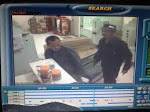Closed-circuit television system is a collection of a video camera, a monitor and a recorder. They allow images to be viewed. More complex
CCTV systems allow images to be viewed in sequence, at the same time or on several monitors at once all depending on the system.
They can record events in color or in black and white. The position of the camera can either be fixed or can be remote-controlled to vary the focus; this allows the camera to view activities in different locations.
Zoom lenses allow selected close-ups or a view of the wider area. With the technology constantly improving cameras can now use night vision; they can be extremely small and also transmit images over the internet.
CCTV videotapes have been used to "patrol" areas which have negated the need to put policemen on the beat. They can be used to establish if a police response is needed, and also used to identify a perpetrator whilst providing valuable clues.
In Newcastle, the analysis of crime data showed that, in the short-term, the presence of CCTV cameras had a deterrent effect on some types of offenses. This included property offenses, which fell by 56 percent, criminal property damage by 34 percent, and no motor-vehicle theft by 11 percent.
The use of CCTV is on the increase in the UK and other western countries. Researches are still trying to determine if the cameras decrease overall crime rates. Studies have looked at the data and still cannot decide if targeted crimes were simply displaced to neighboring sites.
Recent research, using search strategies, resulted in 22 CCTV evaluations which met the set criteria. These were carried out in three settings: city center or public housing, public transport, and car parks.
The result findings of the 22 found that, eleven cameras had the desired effect, it clearly showed a reduction. Five found an undesirable effect, in that some of the cameras came under attack. Five found clear evidence that CCTV had no effect on crime, that is to say the crime levels were still the same. The remaining one was classified as finding an uncertain effect on crime as the evidence was unclear.
It is clear that CCTV has an impact on crime, the fact that perpetrators can be caught in the act, or they are put in a frame with risk of future detention. CCTV also gives members of the public a feeling of increased security, which in turn may deter potential offenders (too many witnesses). Whatever your views on
CCTV it is clear that they are here to stay, and with improved technology we can be sure that future schemes will be implemented in all sorts of settings.
Linda Thurlow advocates CCTV cameras to protect your home and or property against criminality.
CCTV Cameras
OneStopCCTV







 Jakarta Time
Jakarta Time